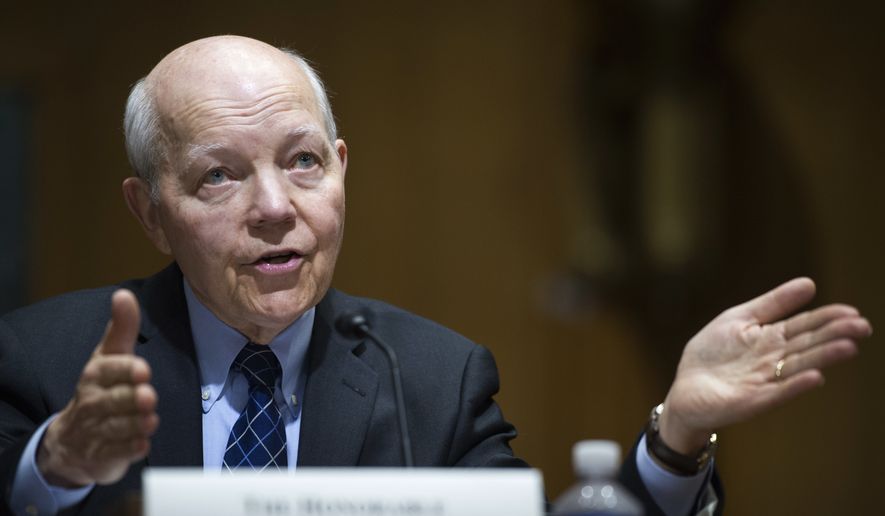The government apologized Thursday for illegally targeting tea party groups for intrusive scrutiny and agreed to settlements with hundreds of organizations snared in the targeting, bringing to a close one of the more embarrassing episodes of the Obama administration.
Attorney General Jeff Sessions said the IRS owed the groups an apology after years of poor treatment and even longer refusal to concede bad behavior. He placed blame on “the last administration,” saying the targeting that went on under President Obama “was wrong and should never have occurred.”
One of the settlement agreements, filed in federal court in Washington, D.C., officially admits that the IRS singled out groups because of their political beliefs, in defiance of the law. The other settlement, in a class-action lawsuit in Ohio, includes a “generous” payout to more than 400 groups snared, according to a lawyer involved.
“There is no excuse for this conduct,” Mr. Sessions said in a statement. “Hundreds of organizations were affected by these actions, and they deserve an apology from the IRS.”
As of Thursday morning, however, the groups said they had yet to get such an apology.
“A true reckoning is finally up to the agency itself. Until the IRS itself steps forward to admit what really happened, we cannot have faith that the same abuse won’t be repeated again,” said Edward Greim, the lawyer who handled the class-action lawsuit for NorCal Tea Party Patriots and more than 400 other groups.
There are still some parts to the cases outstanding.
Mr. Greim and his team managed to depose former senior IRS executive Lois G. Lerner during the four years his case ran, but those transcripts remain sealed along with records of the deposition of another employee, Holly Paz. The two women have told a judge they fear for their safety if their testimony is released.
But on Wednesday the Cincinnati Enquirer asked the court to make those records public, as well as unredacted court documents that refer to the testimony.
The settlements end two separate lawsuits covering more than 450 groups identified by the IRS as having been snared in the targeting.
The vast majority of them are conservative-leaning groups which began to see long delays, intrusive questioning and other illegal scrutiny when they applied for tax-exempt status as either 501(c)(3) or 501(c)(4) organizations beginning in 2009.
In the new filings the singled out Ms. Lerner for particular blame in the scheme, saying she “failed” to stop the targeting going on by her employees, and further failed to alert higher-ups at headquarters in Washington — where she also worked — of the problems.
That’s a major shift from before, where the Justice Department — far from blaming Ms. Lerner — actually credited her with being a hero, saying she tried to stop the targeting when she became aware of it.
A lawyer for Ms. Lerner didn’t return an email for comment sent late Wednesday.
Tom Zawistowski, head of the Portage County TEA Party in Ohio, said Ms. Lerner should have faced criminal charges for her role, which court documents filed earlier in the case show involved her trying to shield the activity by changing names, but overall approving and in fact intensifying the scrutiny the conservative groups were given.
He said he still wants to see a special counsel appointed at the Justice Department to pursue the case and get to the bottom of the motive behind the targeting.
Despite initial claims by some Republicans, no evidence has ever traced the targeting back to Mr. Obama or his top political aides.
But emails released this year show the IRS was made aware by its own agents that it was singling out groups based on their politics, not on questions about their tax behavior.
“These cases are held back primarily because of their political party affiliation rather than specifically any political activities,” Elizabeth C. Kastenberg, an official in the agency’s Exempt Organizations division, wrote in an April 1, 2011, email to other IRS employees, including her supervisor.
That contradicts the IRS’s long-stated position that Ms. Lerner and others involved in the targeting were worried in the wake of a 2010 Supreme Court decision about a surge of groups going beyond the usual rules of politics.
• Stephen Dinan can be reached at sdinan@washingtontimes.com.




Please read our comment policy before commenting.